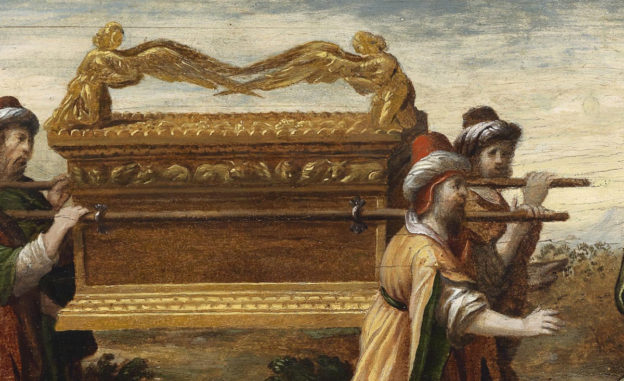It seems like the Church of Christ is on the back foot in the West today. Many treat the Church, Christians, and God’s standard of holiness and morality as a joke. Even many professing Christians casually and easily bow to the desires and pleasures of the day. We live in a Pagan culture; one where it is possible to despair for our children, each other, and the Church.
But despite the gloom, God still reigns and is in control. The gods of this age will be laid low, one way or another. It has happened before, it will happen again. It happened in Samuel’s day when the Ark of the Covenant was taken to the Philistine lands. There, the pagan Philistines learned that their idols were no match for God, and that God will send judgement on unbelievers for their rebellion against him.
The defeat of Israel sent shockwaves through Shiloh. The Ark of the Covenant, the visual reminder of God’s special presence and relationship with his people, was taken. People tore their clothes and mourned, Eli the high priest died, and his daughter-in-law died in childbirth.
In Chapter 5, the fate of the Ark unfolds. As with armies everywhere, this prized possession was taken back as booty by the Philistines to one of their towns, Ashdod (v.1). There, they placed the Ark in the temple of one of their gods, Dagon, who seems to have been a fertility/agriculture idol (v.2). This followed the pattern of ancient cultures, where the captured idols and symbols of other nations were placed as “prizes” in the temples of the “conquering” god. In effect, the Philistines were saying that Dagon bet God.
God had other ideas. In the morning, Dagon’s statue was knocked over (v.3), lying prostrate before God’s Ark like a subject bowing down low before their king. God laid low the false god in front of the Ark which represented the presence of the One True God.
The Philistines “took Dagon and put him back in his place” (v.3), upright. But the next day, God took Dagon and put him back in his place – on the floor (v.4). With the head and hands chopped off. This act mirrored the ancient custom of chopping the hands and head off of slain enemies as macabre trophies. Years later, Dagon’s priests would not step on his temple threshold as a result (v.5).
The humiliations did not end there. God punished the idolatrous pagan Philistines of Ashdod by afflicting them with tumours (v.6), probably bubonic plague which in ancient times (up until recent years) was spread by rodents via ships.
The fine pagan folk of Ashdod could bear it no more and, perhaps hoping the problems were location-based, shipped off the Ark to Gath (vv.7-8). But God is not confined by city limits, and the problems simply moved to Gath with the Ark (v.9).
The People of Gath were not interested in death by plague, so they tried to pass the Ark onto the next major town of the Philistines, Ekron (v.10). The Ekronites immediately rebelled in terror: “They have brought around to us the ark of the God of Israel to kill us and our people” (v.10).
Wherever the Ark went, a terrible deadly panic fell on the idolatrous Philistines, along with bubonic plague and death (vv.11-12). God’s hand “was very heavy” (v.11) wherever the Ark was, bringing judgement on those who stood against God.
This event from the past has been repeated through history, whether in Babylon (Daniel 5) or in our own world today (though we refuse as a culture to recognise God’s heavy hand through means such as war and disease). One day, God has revealed that he will bring judgement on all the nations; on every nation and economic-cultural industrial complex throughout history which opposes his rule.
Ultimately, God is in control and quite capable of taking care of himself. Our job is not to “take back the nation for Christ” by political or other means but to worship God and proclaim the Gospel, and let God put the idols of our culture in their place.
We ought not to let the Church become easy prey for the culture to subvert to its own glory, offering false praise as bounty to its idols. Our call is to promote the peace and purity of the Church, starting with our own lives as part of the corporate body.
This passage reminds the world around us, whether they want to admit it or not, that God is in control. That Jesus sits at God’s right hand, having defeated sin and death. One day, Jesus will return to put all enemies under his feet, to break down every idol, and to bring deathly terror to every unrepentant sinner. Our job in the meantime is to announce the promise of God’s pardon to the world through faith in Christ, no matter how they receive it.
Even though they might think God is a joke today, one day they will not be laughing.

